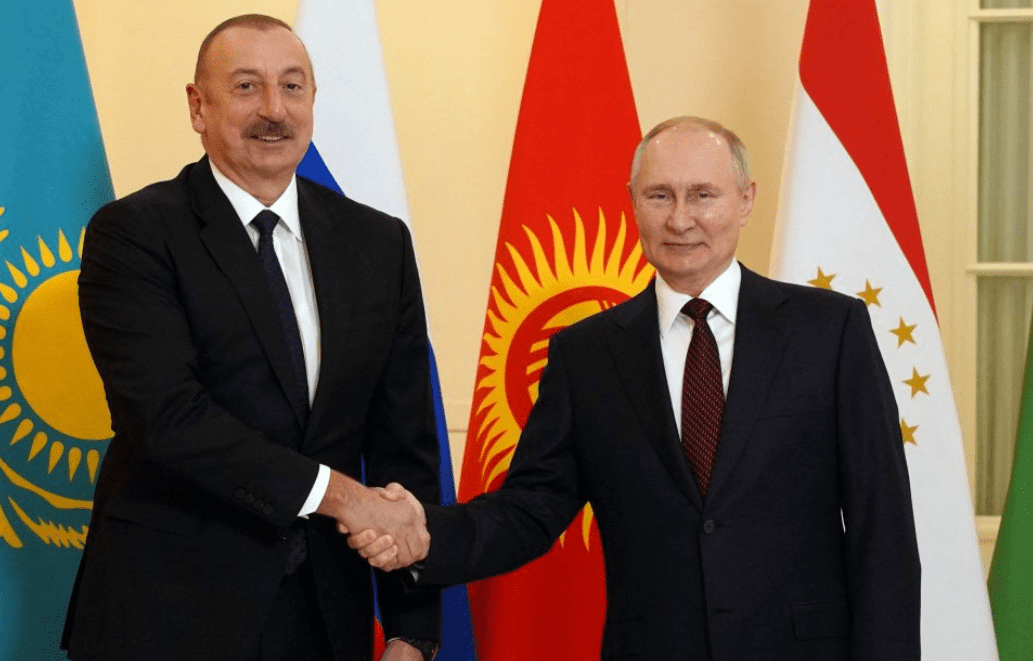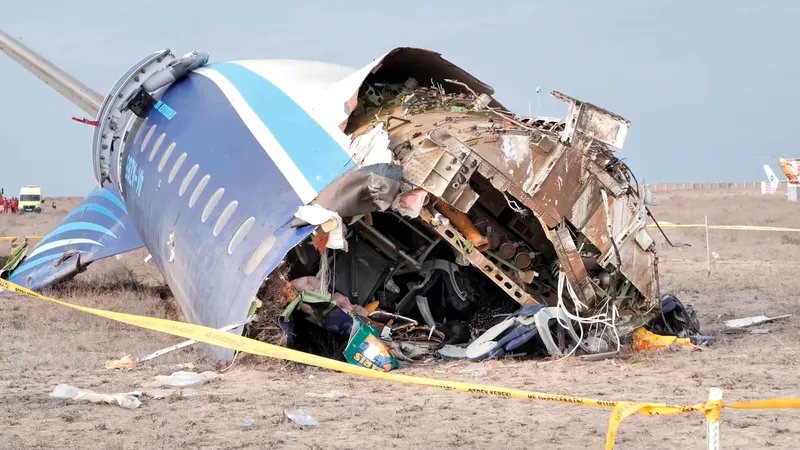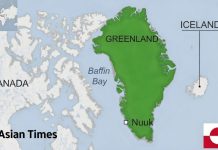Even as Russia’s war in Ukraine is showing no signs of slowing down after more than 40 months, Russian military bloggers are already threatening another former Soviet state.
Relations between Russia and this former Soviet state in the Caucasus have deteriorated steadily over the past few years. However, a string of developments in the last two months have led the situation from bad to worse, and now military and nationalist bloggers in both countries are openly demanding action against the other country.
Russian military bloggers are warning that Azerbaijan, a former Soviet state in the Caucasus, is advancing on the path of Ukraine and behaving like NATO’s outpost on the Russian border.
Notably, Azerbaijan borders Georgia, another former Soviet state with which Russia fought a war in 2008, resulting in the occupation of 20% of Georgian lands by Russian forces.
These occupied territories, South Ossetia and Abkhazia, have declared independence from Georgia and are recognized as independent countries by Russia and four other countries, including Nicaragua, Venezuela, Nauru, and Syria.
Now, Russian military bloggers are demanding similar action against Azerbaijan.

Will Azerbaijan Become The Next Ukraine?
The angry reaction by Russian war bloggers came after the President of Azerbaijan, Ilham Aliyev, stated that Ukraine should never accept Russian occupation.
Speaking at the third Global Media Forum on July 20, President Aliyev responded to a question from a Ukrainian journalist, asking what advice he, as the leader of a “victorious nation,” would offer to Ukraine.
The President of Azerbaijan stated that he advises “never to give up and never to accept the violation of territorial integrity.”
Furthermore, Aliyev announced that Azerbaijan was preparing documents to submit to an international court regarding the Azerbaijan Airlines plane crash in Kazakhstan, which was likely shot down by the Russian air defenses in December 2024.
His remarks drew sharp reaction from Russian war bloggers, many of whom demanded action against Azerbaijan for its continuous provocations.
Azerbaijan, the Russian war bloggers wrote, was following in “Ukraine’s footsteps,” and that a conflict with Azerbaijan is “inevitable in one form or another.”
Pro-war blogger Alexey Zhivov (113,000 subscribers) said that the statements by the Azerbaijani president were “openly hostile” and wrote that “the Caspian could soon become another theater of military operations.”
The channel “Zapiski Veterana” (321,000 subscribers) wrote that “Baku is rapidly turning into a NATO branch and is consciously following in Ukraine’s footsteps.” This is “a veiled signal that Azerbaijan is preparing for war with Russia.”
War blogger Semyon Pegov (898,000 subscribers) described the conflict with Baku as “inevitable.” “Azerbaijan has openly and publicly taken a Russophobic position. And the sooner we start preparing for this conflict, the better,” Pegov wrote.
Similarly, popular war blogger Yuri Podolyaka (3.1 million subscribers) said that Aliyev “has adopted a line of escalation” and “only the force shown to him can make him change it.” “The state of Azerbaijan is not only an unfriendly country for Russia today, but also a geopolitical enemy,” Podolyaka wrote.
The popular sentiment on Russian war blogger channels on Telegram was clear that a war with Azerbaijan is “inevitable,” and the sooner Moscow starts it, the better it is for Russia.
It is worth noting that Russian war bloggers have a significant following and considerable influence on popular sentiment in Russia, often surpassing the influence of traditional media platforms, such as newspapers and television channels.

Russia & Azerbaijan’s Deteriorating Relations
Azerbaijan was one of the 15 Soviet republics. It gained independence in 1992. Relations between Russia and Azerbaijan began on a positive note, and Baku even joined the Russia-led Collective Security Treaty Organization (CSTO) in 1993.
However, Baku left the security alliance, often referred to as the Russian NATO, in 1999.
In 2009, Azerbaijani media reported allegations that Russia had transferred US$800 million worth of weapons to Armenia, escalating tensions due to Armenia’s conflict with Azerbaijan over Nagorno-Karabakh.
Nagorno-Karabakh was a persistent issue, as Armenia was still part of the CSTO, which meant that Russia was treaty-bound to come to Armenia’s defense in case of a war. Azerbaijan always felt that Russia would support Armenia if a war broke out between the two on the issue of Nagorno-Karabakh.

However, things took a sharp turn after 2020. Russia deployed a peacekeeping force following the 2020 Nagorno-Karabakh War, sending 1,960 peacekeepers to the region.
Russia launched its invasion of Ukraine in February 2022. Seeing that Russia was preoccupied with the Ukraine war, Azerbaijan sensed an opportunity and initiated another conflict with Armenia.
In 2023, Azerbaijan’s lightning military campaign reclaimed full control of Nagorno-Karabakh, ending Armenian separatist control.
Azerbaijan’s decision to launch a military campaign despite the presence of a Russian peacekeeping force angered Russia, but due to its involvement in the Ukraine war, Moscow did not react.
Meanwhile, Azerbaijan’s growing closeness with Turkey was another factor worrying Moscow. Russia views the Southern Caucasus region as its backyard and is opposed to outside countries interfering in this region.
Azerbaijan joined the Organization of Turkic States (OTS), an alliance led by Turkey, in 2009. In 2021, Turkey and Azerbaijan signed the landmark Shusha Declaration, which elevated Turkish-Azerbaijani ties to the level of an alliance. Turkish drones were a crucial factor in Azerbaijan’s victory over Armenia in 2023.
Moscow is concerned that Turkey can leverage its historical, linguistic, and religious ties to increase its influence in the South Caucasus and Central Asian regions, which are former Soviet states and are still seen by Moscow as its backyard.
Baku has also joined the troika of Turkey, Pakistan, and Azerbaijan, an emerging alliance competing for leadership of the Muslim world. This Muslim solidarity can have consequences not only in Central Asia but also in many Muslim-majority Russian regions such as Chechnya and Dagestan. Notably, these Russian regions have faced violent separatist movements in the past.
However, the Russia-Azerbaijan relationship suffered the biggest setback in December last year, when an Azerbaijan Airlines plane crashed in Kazakhstan, after it was likely shot down by a Russian air defense system, killing 38 passengers.
Azerbaijan demanded a formal apology from Russia. Putin did apologize for the “tragic incident,” however, he did not admit Russian responsibility, noting only that Russian air defense systems were active near Grozny, Chechnya, repelling Ukrainian drone attacks when the plane attempted to land.
In the last week of June, Russian special forces conducted a raid targeting ethnic Azerbaijanis in Yekaterinburg, investigating murders from the early 2000s. The operation resulted in the deaths of two brothers, Ziyaddin and Huseyn Safarov, with Azerbaijan alleging torture and extrajudicial killings. Over 50 Azerbaijanis were detained, sparking outrage in Baku.
Azerbaijani authorities responded by raiding Russia’s Sputnik news agency and detaining eight officials after accusing them of espionage and cybercrimes.
Azerbaijan is also demanding that Russia accept its guilt in downing the Azerbaijan Airlines plane, compensate the victim families, and Azerbaijan Airlines, and is preparing to sue Moscow in international courts for this purpose.
However, Azerbaijan’s open support for Ukraine seems to have riled the Russian war bloggers more than anything. They believe Baku has crossed a red line and must bear the consequences.
If Russia and Azerbaijan relations go down the same route, another Russian war in the Caucasus can not be ruled out. Notably, Russia can also re-activate the Nagorno-Karabakh conflict and its military support to Armenia to initiate a war with Azerbaijan.
Baku must tread carefully.
- VIEWS PERSONAL OF THE AUTHOR.




